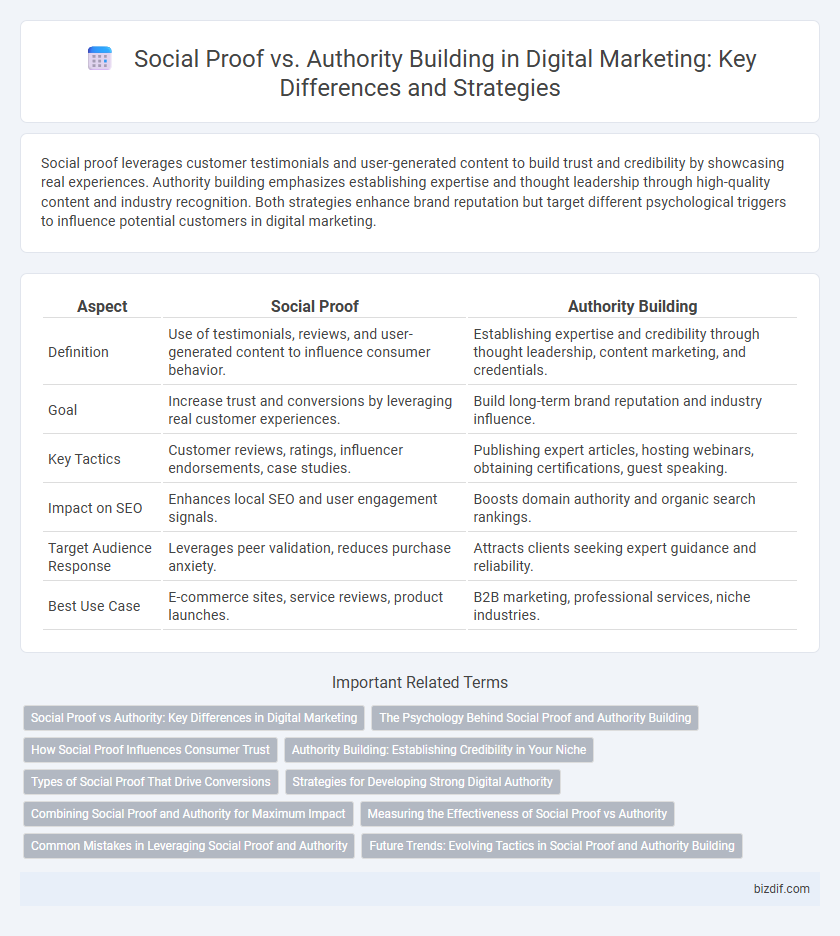Social proof leverages customer testimonials and user-generated content to build trust and credibility by showcasing real experiences. Authority building emphasizes establishing expertise and thought leadership through high-quality content and industry recognition. Both strategies enhance brand reputation but target different psychological triggers to influence potential customers in digital marketing.
Table of Comparison
| Aspect | Social Proof | Authority Building |
|---|---|---|
| Definition | Use of testimonials, reviews, and user-generated content to influence consumer behavior. | Establishing expertise and credibility through thought leadership, content marketing, and credentials. |
| Goal | Increase trust and conversions by leveraging real customer experiences. | Build long-term brand reputation and industry influence. |
| Key Tactics | Customer reviews, ratings, influencer endorsements, case studies. | Publishing expert articles, hosting webinars, obtaining certifications, guest speaking. |
| Impact on SEO | Enhances local SEO and user engagement signals. | Boosts domain authority and organic search rankings. |
| Target Audience Response | Leverages peer validation, reduces purchase anxiety. | Attracts clients seeking expert guidance and reliability. |
| Best Use Case | E-commerce sites, service reviews, product launches. | B2B marketing, professional services, niche industries. |
Social Proof vs Authority: Key Differences in Digital Marketing
Social proof in digital marketing leverages user-generated content, reviews, and testimonials to build trust by showcasing real customer experiences, while authority building focuses on establishing expertise through authoritative content, expert endorsements, and thought leadership. Social proof increases conversion rates by validating choices through peer influence, whereas authority enhances brand credibility and long-term recognition in the industry. Effective campaigns integrate both strategies to maximize engagement and brand loyalty.
The Psychology Behind Social Proof and Authority Building
Social proof leverages the psychological principle of conformity, where individuals are influenced by the actions and endorsements of others to validate their decisions in digital marketing. Authority building taps into the cognitive bias that people naturally trust and follow experts or credible figures, boosting brand credibility and consumer confidence. Both strategies exploit fundamental human behaviors to enhance persuasion and increase conversion rates effectively.
How Social Proof Influences Consumer Trust
Social proof significantly influences consumer trust by showcasing real user experiences, such as reviews, testimonials, and case studies, which validate a brand's credibility. Platforms like Google Reviews and Trustpilot enhance perceived reliability by aggregating authentic feedback that future customers rely on when making purchasing decisions. This collective endorsement often drives higher conversion rates compared to authority building alone, as peer validation taps directly into consumers' innate desire for social conformity.
Authority Building: Establishing Credibility in Your Niche
Authority building in digital marketing establishes credibility by consistently showcasing expertise through high-quality content, industry certifications, and thought leadership. Leveraging guest blogging on reputable platforms and engaging in speaking opportunities amplifies brand trust and influence within the niche. This strategic positioning enhances search engine rankings and fosters loyal customer relationships rooted in perceived authority.
Types of Social Proof That Drive Conversions
Customer testimonials, influencer endorsements, and user-generated content serve as powerful types of social proof that significantly boost conversion rates by building trust and credibility. Displaying real-time purchase notifications and customer reviews leverages the psychological principle of social validation to encourage faster decision-making. Case studies and expert validations further enhance perceived authority, reinforcing consumer confidence and driving higher engagement.
Strategies for Developing Strong Digital Authority
Developing strong digital authority requires a strategic balance between social proof and authoritative content creation, leveraging customer testimonials, expert endorsements, and consistent high-quality publishing. Utilizing influencer partnerships and thought leadership articles can enhance credibility, while transparent engagement on social platforms builds trust and reinforces brand reputation. Prioritizing SEO-rich content and authoritative backlinks ensures sustained visibility and dominance in digital marketing landscapes.
Combining Social Proof and Authority for Maximum Impact
Combining social proof and authority building amplifies digital marketing effectiveness by leveraging customer testimonials and expert endorsements to establish trust and credibility. Utilizing user-generated content alongside authoritative industry certifications creates a powerful narrative that persuades potential customers more efficiently. Integrating these elements in marketing strategies enhances brand reputation and drives higher conversion rates through validated influence.
Measuring the Effectiveness of Social Proof vs Authority
Measuring the effectiveness of social proof involves tracking conversion rates, user engagement metrics, and customer testimonials that demonstrate trust and peer validation. In contrast, authority building effectiveness is assessed through domain authority scores, backlink quality, and brand mentions by industry experts, which enhance credibility and search engine rankings. Both metrics provide insights into how each strategy influences consumer behavior and brand perception within digital marketing campaigns.
Common Mistakes in Leveraging Social Proof and Authority
Common mistakes in leveraging social proof include over-reliance on generic testimonials that lack credibility and failing to update social proof regularly, which diminishes trust. In authority building, marketers often neglect providing unique, high-quality content or neglect consistent brand messaging that establishes expertise. Ignoring the balance between authentic social proof and authoritative signals can result in lowered customer confidence and reduced conversion rates.
Future Trends: Evolving Tactics in Social Proof and Authority Building
Future trends in digital marketing indicate a shift towards integrating AI-driven analytics to enhance social proof by accurately identifying influential customer testimonials and user-generated content. Authority building is evolving with interactive, multimedia-rich content like webinars and virtual events that establish expertise more dynamically. Emerging technologies such as blockchain will further authenticate social proof, increasing trust and transparency in brand communication.
Social proof vs Authority building Infographic

 bizdif.com
bizdif.com